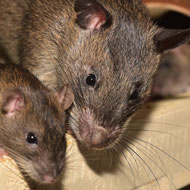Rift Valley Fever Virus can be transmitted from mother to foetus in rats

Foetal death occurred in pups from infected yet asymptomatic dams.
A study, published on ‘Science Advances’, states that it is the first study to demonstrate fatal vertically transmitted infection with Rift Valley Fever Virus (RVFV) in a species other than livestock.
The research discovered direct placental infection with RVFV as a mechanism for vertical transmission and foetal demise in rats and suggests that the results now emphasise the possible impact of a future epidemic.
A pregnant rodent model was developed in the study in order to investigate how RVFV infection during pregnancy affects the foetus. It was found that infection in dams had a widespread viral distribution with preference for replication and tissue damage in the placenta; identifying direct placental infection as a mechanism for vertical transmission.
The study also found that the mortality rate of RVFV infection was greater in pregnant rats than non-pregnant rats, and that foetal death and significant congenital abnormalities occurred in pups from infected yet asymptomatic dams.
Pregnant women infected with RVFV has been associated with miscarriage. The researchers of this study state that their results suggest that even mild RVFV infection may still have a devastating impact on the developing foetus.
RVFV infection in humans results either from infected mosquitoes, or from contact with contaminated blood or organs with infected animals. To date, there have been known cases of human-to-human transmission of RVFV.
The full study can be read here.



 The RCVS has announced a new version of its 1CPD mobile app, with enhanced features for veterinary surgeons and veterinary nurses to record their continuing professional development.
The RCVS has announced a new version of its 1CPD mobile app, with enhanced features for veterinary surgeons and veterinary nurses to record their continuing professional development.